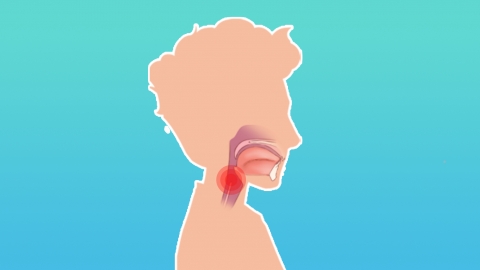What medicine should I take for a sore throat when swallowing saliva?
Generally speaking, the throat refers to the pharynx. Sore throat when swallowing saliva may be caused by dietary irritation, dry environment, acute pharyngitis, acute tonsillitis, epiglottitis, or other reasons. It is recommended to seek timely medical attention and use medications such as Cefalexin Granules, Amoxicillin Capsules, Penicillin V Potassium Tablets, Prednisone Acetate Tablets, and Yinhuang Slices under a doctor's guidance. A detailed explanation is as follows:

1. Dietary Irritation
Consuming spicy, hot, sharp, or irritating foods, such as chili peppers, hot soup, and potato chips, may directly damage the pharyngeal mucosa, possibly leading to mucosal congestion and edema. When swallowing saliva, the contraction of throat muscles and the damaged mucosa may rub against each other, causing pain. Medication is generally not required. It is recommended to maintain a healthy and balanced diet and reduce the consumption of spicy, hot, and irritating foods.
2. Dry Environment
When the ambient air humidity is low, the moisture in the pharyngeal mucosa may evaporate easily, possibly causing dryness and lack of lubrication. During swallowing, the dry mucosa may rub against each other, stimulating nerve endings and causing pain. Medication is generally unnecessary. It is recommended to use a humidifier to increase indoor air humidity.
3. Acute Pharyngitis
Acute pharyngitis is mainly caused by viral or bacterial infections. After infection in the throat area, inflammatory factors may stimulate the pharyngeal mucosa, causing it to become congested and hypersensitive. During the process of swallowing saliva, the movement of throat muscles and the flow of saliva may irritate the inflamed areas, causing pain. Symptoms such as fever and fatigue may also occur. Treatment may include medications such as Cefalexin Granules, Amoxicillin Capsules, and Roxithromycin Dispersible Tablets under a doctor's guidance.
4. Acute Tonsillitis
Acute tonsillitis is mainly caused by bacterial infections such as group B hemolytic streptococcus. When the body's resistance decreases, pathogens may invade, multiply rapidly, and attack the tonsillar crypts, resulting in swollen and pus-filled tonsils that compress surrounding tissues, causing throat pain. Symptoms such as high fever and difficulty swallowing may also appear. Patients may follow medical advice to use medications such as Penicillin V Potassium Tablets, Ibuprofen Sustained-Release Capsules, and Compound Chlorhexidine Gargle for treatment.
5. Epiglottitis
Epiglottitis is often caused by bacterial or viral infections, but may also be due to trauma, allergies, or other factors. Under the stimulation of inflammation, the epiglottis may swell. When swallowing saliva, the saliva passes through the swollen epiglottis area, stimulating nerve endings and causing pain. Symptoms such as difficulty swallowing and hoarseness may also occur. Patients may use medications such as Dexamethasone Sodium Phosphate Injection, Prednisone Acetate Tablets, and Yinhuang Slices under medical advice.
In daily life, individuals should strengthen physical exercise, enhance their constitution, improve immunity, and reduce the likelihood of respiratory infections. At the same time, attention should be paid to oral hygiene, brushing teeth correctly in the morning and evening, maintaining good living habits, and avoiding staying up late or overexertion.





